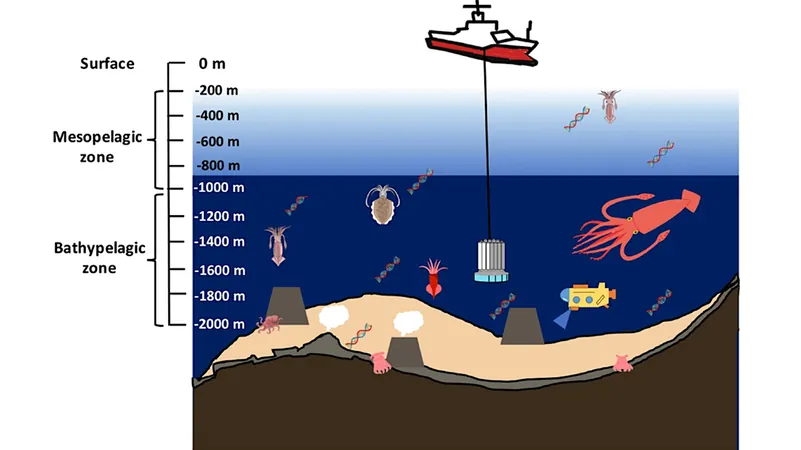
Unlocking the Secrets of the Deep: New DNA Probes Reveal Hidden Lives of Cephalopods
2025-04-16
Author: Yu
Discovering the Depths of Ocean Life
In an exciting breakthrough for marine biology, researchers at Kobe University have developed advanced DNA probes that promise to revolutionize our understanding of squids and octopuses lurking in the depths of the ocean. This innovative tool opens new avenues for ecological research and conservation efforts, shedding light on these enigmatic creatures.
The Vital Role of Cephalopods in Marine Ecosystems
Squids and octopuses, collectively known as cephalopods, are crucial players in marine ecosystems, acting as both predator and prey. According to marine ecologist Wu Qianqian from Kobe University, these creatures help distribute energy and nutrients throughout the food web, making their study essential for understanding oceanic health.
Challenging Deep-Sea Surveys
Unfortunately, the deep-sea habitats of these fascinating animals remain largely unexplored due to their inaccessibility. Wu emphasizes that the deep sea covers vast stretches of our planet, teeming with unknown organisms whose ecologies remain a mystery.
A Breakthrough Technique: Environmental DNA Metabarcoding
To bridge this knowledge gap, Wu and her team turned to a cutting-edge method called environmental DNA (eDNA) metabarcoding. This technique involves analyzing DNA that cephalopods shed into their environment—similar to how fishermen use specific bait to attract certain species. The challenge lies in creating DNA probes that are both specific enough to target particular cephalopods while also broad enough to capture a variety within that group.
Revolutionizing Detection Methods
Working alongside experts from the Japan Agency for Marine-Earth Science and Technology (JAMSTEC), the Kobe University team crafted specialized DNA primers that can effectively detect a wide range of cephalopod species. Their findings, published in *Marine Environmental Research*, highlight successful identifications of cephalopod DNA from deep-sea samples up to 2,000 meters deep, marking a major milestone in marine science.
The Power of Longer DNA Fragments
In a remarkable twist, the team's success can be attributed to their focus on longer DNA fragments, which had not been extensively utilized before. Despite the potential for these larger fragments to degrade, the cold, deep-sea environment helps preserve their integrity, providing a more accurate picture of species distribution.
Insights into Octopus Habitats
Interestingly, the researchers found octopus DNA exclusively in samples from the ocean’s deepest zones. This aligns with the solitary and hidden nature of octopuses, suggesting that their eDNA methodology not only identifies species but indicates their behaviors and lifestyles.
Future Directions: Refining Techniques and Enhancing Collaboration
Looking ahead, Wu acknowledges the need to optimize sampling strategies to better account for the life history and behavior of various cephalopods. She also stresses the importance of addressing potential misidentifications in DNA databases through collaboration with taxonomists and molecular biologists.
A New Era for Marine Conservation
This groundbreaking research, funded by Japan's Ministry of Environment, promises to pave the way for future studies on deep-sea cephalopods and enhance conservation initiatives. As Kobe University continues to lead in interdisciplinary research, their innovative approaches are set to tackle some of the ocean’s most pressing challenges.
Kobe University: A Hub of Innovation
Established in 1902, Kobe University has grown into one of Japan’s premier research institutions, housing nearly 16,000 students and 1,700 faculty members. By merging social and natural sciences, the university is committed to cultivating leaders equipped to confront societal challenges through knowledge and innovation.



 Brasil (PT)
Brasil (PT)
 Canada (EN)
Canada (EN)
 Chile (ES)
Chile (ES)
 Česko (CS)
Česko (CS)
 대한민국 (KO)
대한민국 (KO)
 España (ES)
España (ES)
 France (FR)
France (FR)
 Hong Kong (EN)
Hong Kong (EN)
 Italia (IT)
Italia (IT)
 日本 (JA)
日本 (JA)
 Magyarország (HU)
Magyarország (HU)
 Norge (NO)
Norge (NO)
 Polska (PL)
Polska (PL)
 Schweiz (DE)
Schweiz (DE)
 Singapore (EN)
Singapore (EN)
 Sverige (SV)
Sverige (SV)
 Suomi (FI)
Suomi (FI)
 Türkiye (TR)
Türkiye (TR)
 الإمارات العربية المتحدة (AR)
الإمارات العربية المتحدة (AR)